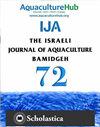The effect of dietary taurine and its potential biosynthesis on juvenile grey mullet (Mugil cephalus) performance
IF 0.5
4区 农林科学
Q4 FISHERIES
引用次数: 0
Abstract
The grey mullet is a catadromous species that spawns in the taurine-rich seawater environment, followed by the young fish generally migrating to less saline, low taurine waters during the larva-juvenile transition. Consequently, this study aimed to (1) determines whether there is a dietary taurine requirement in juvenile grey mullet for enhanced growth and (2) the potential for taurine biosynthesis. The experimental system consisted of sixteen 400-l V-tanks, where filtered, UV-treated ambient seawater (40 ‰) entered the bottom of the tanks at a rate of 7 tank exchanges/day. This allowed the testing of four 1 mm pelleted diets (0, 0.5, 1.0, and 2.0% taurine DW diet) in replicates of 4 tanks/treatment for 58 days. Grey mullet juveniles demonstrated (P<0.05) a specific requirement for a 0.5% taurine DW diet for improved growth. Fish fed the taurine diets displayed populations with a markedly (P < 0.05) higher average number of surviving fish (23.4±1.1) of moderately sized (10- 20 g) cohorts than smaller (< 10 g) individuals (12.5±1.1). In contrast, the fish fed the taurine control (0% taurine) exhibited similar average numbers of small and moderate sized fish (18.0±3.6-20.0±4.1). Dietary taurine accumulated highly (P<0.05) in the muscles in a dose dependent manner but less so (P<0.05) in eyes, and liver. The gene expression of liver cysteine sulfinic acid decarboxylase (CSD) exhibited an upregulation (P<0.05) with taurine diets from 0 to 1% but was down regulated (P<0.05) in fish fed the 2% taurine DW diet.饲料中添加牛磺酸及其潜在的生物合成对灰鲻鱼幼鱼生产性能的影响
灰鲻鱼是一种地栖物种,在富含牛磺酸的海水环境中产卵,随后幼鱼通常在幼虫-幼鱼过渡期间迁移到盐分较低、牛磺酸含量较低的水域。因此,本研究旨在(1)确定幼鱼饲料中是否需要牛磺酸以促进生长;(2)牛磺酸生物合成的潜力。实验系统由16个400-l的v型水箱组成,经过过滤、紫外线处理的环境海水(40‰)以7个水箱交换/天的速率进入水箱底部。这样就可以试验4种1 mm颗粒饲料(0、0.5、1.0和2.0%牛磺酸日粮),每组重复4个罐,连续试验58天。灰鲻鱼幼鱼在饲料中添加0.5%牛磺酸以促进生长(P<0.05)。在牛磺酸饲料中,中等大小(10 ~ 20 g)群体的平均成活率(23.4±1.1条)显著高于较小(< 10 g)群体(12.5±1.1条)(P < 0.05)。相比之下,喂食牛磺酸对照组(0%牛磺酸)的小鱼和中等小鱼的平均数量相似(18.0±3.6 ~ 20.0±4.1)。饲料中牛磺酸在肌肉中的积累量较高(P<0.05),在眼睛和肝脏中的积累量较低(P<0.05)。牛磺酸水平为0 ~ 1%时,肝脏半胱氨酸亚磺酸脱羧酶(CSD)基因表达上调(P<0.05),而牛磺酸水平为2%时,肝脏半胱氨酸亚磺酸脱羧酶基因表达下调(P<0.05)。
本文章由计算机程序翻译,如有差异,请以英文原文为准。
求助全文
约1分钟内获得全文
求助全文
来源期刊
CiteScore
0.90
自引率
16.70%
发文量
49
审稿时长
3 months
期刊介绍:
Information not localized

 求助内容:
求助内容: 应助结果提醒方式:
应助结果提醒方式:


